Search the Special Collections and Archives Portal
Search Results
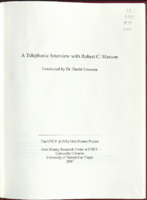
Transcript of interview with Robert C. Maxson by Dr. David Emerson, May 15, 2007
Date
Archival Collection
Description
Text
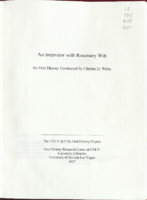
Transcript of interview with Rosemary Witt by Claytee D. White, November 7, 2006
Date
Archival Collection
Description
Text
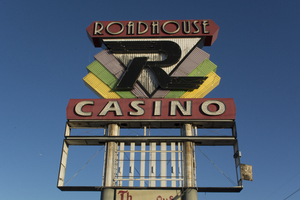
Photographs of Roadhouse Casino sign, Las Vegas (Nev.), March 14, 2017
Date
Archival Collection
Description
Site address: 2100 N Boulder Hwy
Sign owner: Robert McMackin
Sign details: Roadhouse approved for gaming 1988, Robert McMackin bought the Roadhouse 1992, but it closed 2002. They planned to refurbish and reopen by 2010 but has been in legal trouble and has not reopened.
Sign condition: 2- reader board portion/plastic back lit portion is gone and paint has faded drastically
Sign form: Pylon
Sign-specific description: Big Letters on top "Roadhouse" below Is a Huge Letter "R". Still up but in horrible condition. Reader board is a frame and appears to be scrapped. No upkeep has been made to the sign. There is an array of colors behind the 'R' such as purple, white, yellow and green in a parallel plume shape.
Sign - type of display: Neon
Sign - media: Steel
Sign - non-neon treatments: There must have been plastic on this sign since there is a sign box that would contain it.
Sign environment: This location is on Boulder Hwy. near Sunset Road.
Sign - thematic influences: The letter R in the middle of the sign is remnant of the 1980's car/video game font.
Survey - research locations: Las Vegas Sun Article synopsis https://vegasinc.lasvegassun.com/business/legal/2012/mar/26/city-henderson-reverses-course-roadhouse-casino-li/ Review Journal article https://www.reviewjournal.com/business/casinos-gaming/station-casinos-henderson-settle-roadhouse-dispute/
Survey - research notes: The articles were helpful with finding information on this property since other avenues did not have any information on it.
Surveyor: Wyatt Currie-Diamond
Survey - date completed: 2017-09-01
Sign keywords: Pylon; Neon; Steel; Plastic; Incandescent; Backlit; Back to back
Mixed Content

Jocelyn Cortez interview, March 18, 2019: transcript
Date
Archival Collection
Description
Interviewed by Nathalie Martinez. Jocelyn Cortez is a Salvadoran-American immigration lawyer. She grew up on the Eastside of Las Vegas and grew up going to school in the Clark County School District and at UNLV before going to Law School at the University of Arizona. She is an engaged community member as an immigration lawyer working alongside the Culinary Union and the Latino Bar Association.
Text

Interview with Sandie A. Medina, January 25, 2004
Date
Archival Collection
Description
Text

Interview with Roger William Anderson, September 20, 2005
Date
Archival Collection
Description
Text
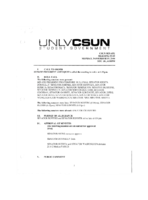
Meeting minutes for Consolidated Student Senate, University of Nevada, Las Vegas, November 15, 2004
Date
Archival Collection
Description
Text
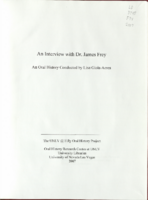
Transcript of interview with Dr. James Frey by Lisa Gioia-Acres, February 14, 2007
Date
Archival Collection
Description
Text
Steve Sisolak (Nevada Governor) oral history interview conducted by Magdalena Martinez: transcript
Date
Archival Collection
Description
From the Lincy Institute "Perspectives from the COVID-19 Pandemic" Oral History Project (MS-01178) -- Elected official interviews file.
Text
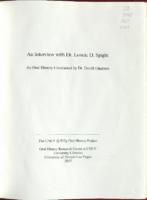
Transcript of interview with Dr. Lonnie D. Spight by Dr. David Emerson, May 8, 2007
Date
Archival Collection
Description
Text
